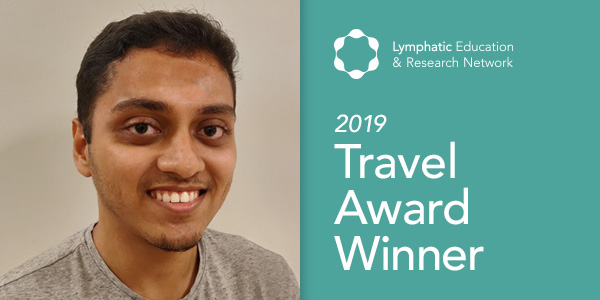Anish Mukherjee, currently a Ph.D. candidate at Georgia Institute of Technology in Atlanta, Georgia, under the supervision of Dr. J. Brandon Dixon, received a Travel Award from LE&RN to attend the Lymphatic Forum in Austin, TX. We asked Anish to share his thoughts on that experience with us and to tell us a bit about his research and future plans.
What did you get out of the Lymphatic Forum? Why did you feel it was important to attend?
My biggest takeaways from the conference were the numerous insights and suggestions I got for my project during the poster session which will definitely have a significant impact on my project. I think one of the biggest strengths of the Lymphatic Forum is providing exposure to people who are intimately associated with your field, which means that the depth of the guidance and advice you can get is not possible at other conferences. This was also a great forum to showcase my work to the lymphatic community. The nano-talk I was selected for was helpful to let my work be known among other researchers and can hopefully stimulate some discussions and future work as well.
What are your areas of interest in research?
I am interested in how collecting lymphatic vessels respond to mechanical stimuli and how that relates to their physiological function and pathophysiology. Specifically, I am investigating the role of oscillatory shear stress and transmural pressure on the synchronized contraction of lymphatic vessels. I am approaching this problem from multiple angles, including in vitro studies using microfluidics, ex vivo isolated vessel studies, and in vivo studies on rat models.
What are your hopes and plans for your career and your research?
I hope to be involved with both teaching and research in tissue mechanics, educating and training the next generation of researchers and enabling them to solve some of the most pressing issues in the field of lymphatics and tissue biomechanics.
Why do you believe that, in general, lymphatic research is important? What might the field accomplish within the next few years?
The field of lymphatic biology is still in its infancy compared to vascular biology and we still need to develop a clear understanding of the basic physiology of the system in order to start answering the questions and solving the problems, associated with lymphatic dysfunctions. I believe that in the next few years we will be able to delineate a lot of the pathways involved in lymphatic mechanotransduction and develop a better understanding of how impaired biomechanical properties of the lymphatics lead to lymphatics-related diseases. This will enable us to start developing therapeutic tools that can be used to enhance lymphatic function and resolve some of the lymphatic pathologies such as lymphedema.
LE&RN programs, like LE&RN Travel Awards, are only possible because of our Partners and Supporting Members. Become a Supporting Member today.

